The Fujifilm X100VI is not the camera for everybody, but it sure as hell is one of the most fun I’ve had in photography in a long while. It’s a relatively simple, fixed 23.5 mm lens shooter that takes some brilliant, highly detailed photos at 40.2 MP. I would want to recommend it to anybody. However, at $1,600 for the base camera, I can’t suggest that anybody reach so deep into their wallet for this faux-physical, all-digital camera. Instead, I can say the X100VI unlocked a love for photography that I thought had become dormant.
Though we’ve seen this before. The X100VI is the sequel to 2020’s X100V (thankfully, the X100 series has developed a consistent naming scheme after Fujifilm decided to stick to Roman numerals). The four-year refresh offers a number of fair improvements, including the jump from 26.1 MP to 40.2 MP and in-body image stabilization (IBIS) with its 5-axis stabilization. Those are the two main improvements to what was already a nice, rather viral camera that received undue attention after TikTokers started futzing around with it. Unfortunately, the X100VI costs $200 more than the X100V’s starting price four years ago.
How Does it Feel to Shoot with the Fujifilm X100VI?
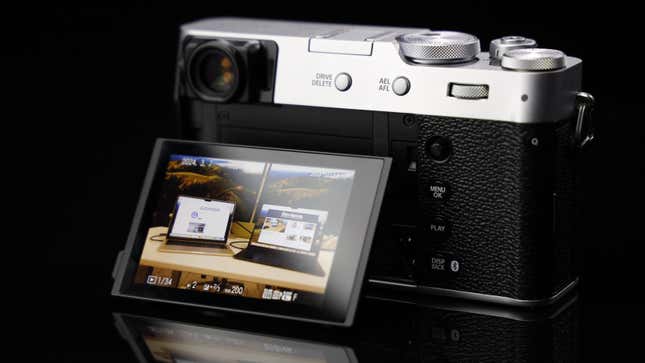
Some might come away looking at the price tag and travel-sized camera, wondering why they would even opt for something that seems limited. The best camera advice I ever received was “get closer, get lower.” I don’t remember who told me that. Perhaps I made it up myself, but I remember the mantra every time I whip out a camera, whether it’s for shooting product shots or taking pics of my friends. It’s not perfect advice. There are so many times a good shot requires you to be further away or perched high up, but for a beginning photographer, it pushes you to find the detail in things, the unique angle to see an object from a perspective not seen in your usual day-to-day life. It all comes down to composition, and that’s where the small-sized Fujifilm series excels.
A small body, single lens camera does more than emphasize that “closer, lower” mantra, it enforces it. I’ve said it before in my Freewrite Alpha review. Restrictions can help breed creativity. When I was still a local reporter working obscene hours to cover every government and school board meeting, I would relish opportunities to whip out my Nikon D3400 to snap photos outdoors, away from the dim light of our old and increasingly vacant newsroom office. I lost that over the years. The Fujifilm X100VI brought it back in a new, unexpected way.
I was constantly looking for new angles and ways to use the natural light to my advantage. As you force yourself to attack your subject from new angles, you start to notice interesting framing opportunities or details that become your new focal point. Now, this is an old hat for anybody who even dabbles in photography, but as a sub-amateur who felt he had lost his eye for photography, it was something of a revelation.
If you were concerned that Fujifilm’s switching its production to China would impact its quality, know that I didn’t see any imperfections or rough edges during my time with it. The silver on black still looks as elegant as ever (even if my coworkers call me nuts for preferring the black brushed steel on black).
Of course, there’s going to be slight imperfections. While the main body looks like a film camera, it doesn’t exactly feel like you’re shooting with one. I would personally prefer the shutter button to be a little stiffer, especially when you fully press it down to capture an image (the button is threaded to allow you to install your own button topper). There’s not enough tactile feel, even when opting for the fake shutter sound. I also wish the screen could do more than flip out of the camera body and potentially swivel when you’re really trying to see what you’re capturing from odd angles. It’s not asking for much, especially considering that the X100VI is $200 more expensive than its predecessor.
What is the Image Quality on the Fujifilm X100VI?
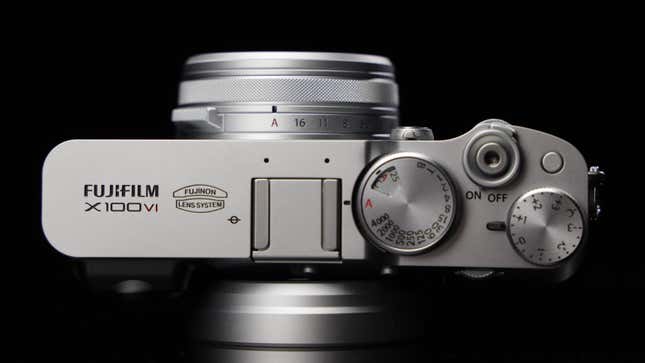
The best way to shoot on the Fujifilm X100VI is in the Fine + RAW settings, as you can get the highest-quality JPGs plus the RAW file type if you want to mess around with it later. You’ll want to go heavy on the file size because the camera takes very detailed photos. Don’t hand the camera off to your friends to let them take pictures, or you may become distracted by the pores on your face.
The X100VI also leans heavily on its strong depth of field settings for close-up shots. Even in automatic settings, the camera is very, very good at picking out the correct subject. If you don’t want to fiddle with exposure, especially if you’re just getting started, the automatic settings will still grant you some really sharp-looking photos. After that, you can dig more into the camera to learn its ins and outs so you can start understanding differences in white balance, shutter speed, ISO, and more. The Fujifilm menus aren’t the most esoteric in the camera world, but I still wouldn’t call them newb-friendly. Just like anything, it takes patience and practice to understand your camera.
You can click through the slides to see a selection of photos I took in my two weeks with the camera in hand. Just know our site compresses images, so you’re not getting the best look of each photo in its raw state.
But even if you don’t understand the differences in aperture, thanks to its film simulation settings, you can still do a lot of fun things with the X100VI. These have been a big part of Fujifilm’s repertoire, and they’re just as fun on the latest X100 Series entry. The new standout mode is the Reala Ace, with its high-contrast tonality, and it’s a good addition to an already strong assortment of film modes.
I was also satisfied with the IBIS when shooting the video. It won’t be a real steady cam for action shots, but it’s good enough to take the edge out of a walking and talking clip. The camera also connects via Bluetooth to the Fujifilm app on your phone, making it a little easier to upload your content on the fly without needing to take out the SD card.
Who is the Fujifilm X100VI For?
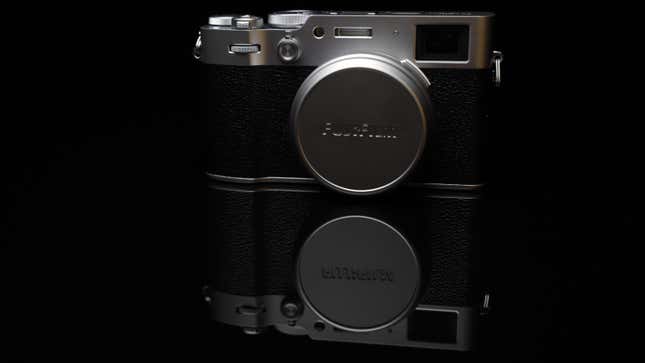
The 2020 X100V became such a hit for TikTokers thanks to its real retro design and its ability to mimic different kinds of film, like Fuji’s famed 35mm Film Simulation mode. Despite that, it’s not exactly the perfect video camera for everything. Even ignoring the single 23.5mm non-removable lens, the video settings aren’t as accessible compared to your average camcorder, vlogging camera, or even your phone, none of which will run you up the full $1,600 that the X100VI will set you back
Of course, the ability to shoot or record in simulated Acros black and white or the Reala Ace 35mm film reproduction is so damn fun. If you’re the very definition of a shutterbug, then you have plenty of other cameras that will make up for the X100VI’s lack of range. For everyone else, you’d have to understand where a single-lens shooter fits into your life. If you expect to do a lot of nature photography, the fixed lens won’t do you any good trying to pick out a fox skulking through the forest, not unless it will let you get very, very close.
Does the jump in MP result in better photos? Yes, but only by the nature of the jump in resolution. Most laypeople wouldn’t pick out the difference in quality between a 26.1 and a 40.2 MP image, especially when they’re uploaded online and compressed. If you already have an X100V, you might do well sticking to what you have unless you have a driving need for IBIS image stabilization and higher-resolution images.
And yet, I don’t know the last time I enjoyed using a camera as much as I did the X100VI. It’s compact and easy to whip out whenever the inspiration strikes. I know whatever photo I take will look good, even in automatic settings. Call me sentimental, but if I had to attribute any of that joy to my own skills or the camera itself, I’d give the nod to the X100VI.










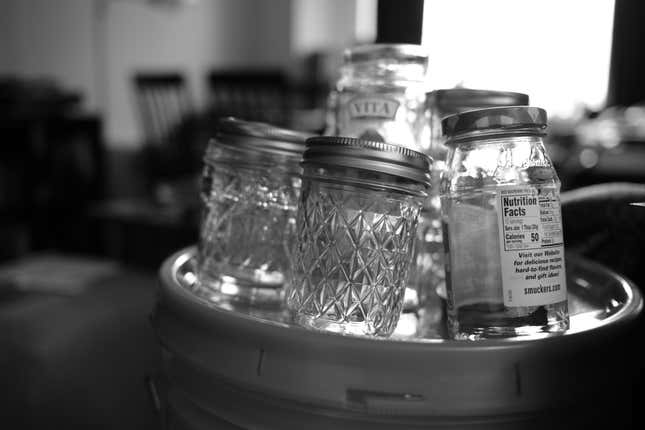
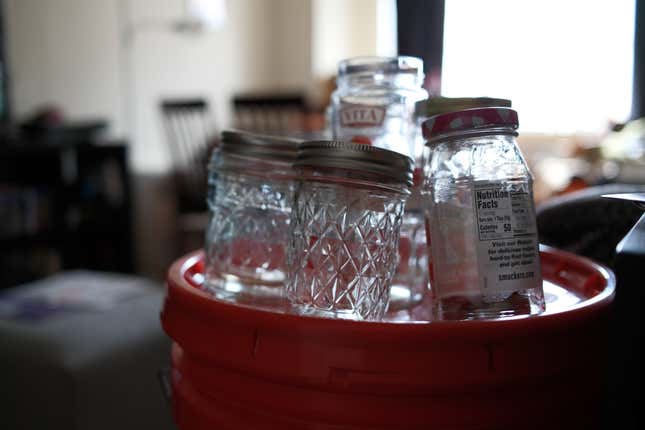










+ There are no comments
Add yours